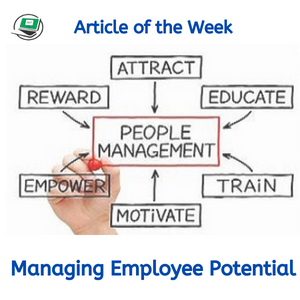 |
Managing Your Employee's Potential |
Working as an employee can be many things – exciting, eventful, fulfilling, fun, daunting, scary, tiring, stressful and frustrating. However, thousands of employees still find reasons to stay at their jobs no matter how it makes them feel. This could be due to many reasons – stability, fulfilment, growth, money etc. – but one thing that has proven to be a constant gratifier when it comes to employee retention is recognition.
Recognition by its very description speaks volumes about an individual. And within a company, this simple act will not just pinpoint but illuminate the potentials of any employee. Think about it, when was the last time you were recognized. I’m not referring to the mundane bouts of praises like that of a Master of Ceremonies at a wedding...I mean real recognition. When was the last time you were acknowledged for a job well done or a project well executed? And when it happened how did it make you feel?
Studies and experience have shown that recognition can pinpoint and boost potential. Being recognized for your ability to manage a team alerts you to your managerial abilities and receiving praises for delivering a speech at an event points you towards your public speaking ability. And this skill of recognizing ability, milestones, effort and achievements is what managers are missing out on which is resulting in a decline in employee potential. But all is not lost. Just like all skills, recognition can be learned, and I am here to teach it.
By applying these tips in your managerial roles, you can help improve employee potential by over 50% and boost employee retention and morale for a more successful business.
1. Start Recognizing Today
When it comes to recognition, it is best to do it in real-time. You can liken this to getting a happy birthday wish 1 week after your birthday. It doesn’t count if it is not timely. The sooner you recognize good behavior amongst your employees, the sooner other employees will adopt the behavior hoping for a positive review. Take note of the project that is active and who is working on it, ask for updates from team leaders, and you could even task them with letting you know specific employees that deserve recognition. You can try sending little vouchers to employees to congratulate them on milestones reached or even e-cards to say a job well done. Every little bit counts!
2. Tie Recognition to your Company’s Culture
One of the major reasons’ companies have great company culture is because it is laced with positive reinforcement. A culture is formed by what is celebrated and your employees need to be infused with this. By celebrating employees that achieve certain heights in accordance with the company culture, you shine a light on the culture of the company and succeed in lacing it with good connotations.
For example: Sending Temi a gift card or free e-book for holding 10 Managerial Monday Morning Meetings in a row reinforces the fact that holding these meetings is a requirement as per the culture of the company and prompts others to take them more seriously.
3. Recognize what is ignored
It is very easy to only notice the big achievements like a promotion, but a great manager also looks out for the little things. Here, I am referring to the little achievements that employees work hard to achieve. Letting them know that you pay so much attention to them that you see their “little wins” tells your employees that you care enough to see them.
Take the time and make the effort to stay updated with employees and what they’re working on. And if you’re unable to notice it all, you can delegate to your assistant or to other managers so it can be a collective effort which will also serve as team building.
4. Be creative & personal
Buying someone a plain birthday cake from ShopRite is saying something. But baking a cake in the person’s favorite color and flavor with an inscription that says “Happy Birthday Chioma” says a whole lot more. When recognizing your employees, do not be generic. Make the effort to be intentional, creative and personal about your recognition.
For example, if you are recognizing a team member who likes listening to music for adding a new client to her portfolio, buying her a new set of headphones would make her feel loved and appreciated. Or celebrating your janitor who has dedicatedly cleaned the office for 10 years with a financial gift would go a long way. Make the means of recognition something they won’t forget. This will make said employee feel more connected to the brand leading to more dedication and improvement in the area they were recognized for.
5. Be specific
When recognizing an employee, ensure you recognize them for a specific job. Recognizing someone goes beyond saying well done for doing a good job – be specific and give details. For example, instead of sending an e-mail saying, “Great job on acquiring a new customer”, say “On behalf of the company I would like to congratulate you on proving yourself yet again in your ability to acquire new customers. We look forward to more achievements in your career. Here’s a gift voucher to get those cups of coffee you love so much.” I guarantee you that employer will come to work the next day feeling appreciated and empowered to acquire new customers. Also, other employees will get to hear about the rewards which will encourage them to explore their abilities more, leading to discovery and exploration of new potential.
Every employee has immense potential for new skill sets and abilities locked within them. And it is part and parcel of their job in your company to explore those hidden potentials for their benefit and yours. A manager’s role is to help facilitate this discovery by any and every means possible while they’re working for you. And a great way to start is through recognition!
Join the conversation! Let's have your thoughts and feedback in the comments section below.
Related Articles

|
Leader-ShiftAs much as we emphasize the impact of leadership in running an organization, many are yet to fully understand and appreciate its vital role in the success or failure of an organization. A typical organization is essentially its people and not necessarily the material and financial resources it has. [Read more]
|
Posted: 7 years ago |

|
The World of Work is Changing, and You Should Too: An Incisive Report on the Future of WorkSynopsis
The way we work has changed in significant ways over the last century and we are on the verge of witnessing unprecedented changes in our work in the years to come. Unless we prepare for these drastic changes, we may not be able to cope with its adverse effects on individuals and t [Read more]
|
Posted: 7 years ago |

|
How to Reinvent Yourself To Be The Best You Can BeChange, they say, is the one thing that is constant. Change is the only thing that keeps happening, and it happens by the millisecond. However, since there are certain things we can’t stop from changing, like our age and bodies, there are things we wish we could change, but don’t know ho [Read more]
|
Posted: 7 years ago |


